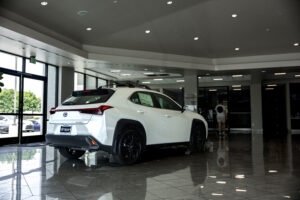
As more drivers in California explore fuel-efficient and eco-conscious options, the debate of hybrid vs electric vehicles is front and center in the car shopping journey. Whether you’re deciding between a new or used car, understanding the key differences, benefits, and lifestyle considerations between a new hybrid car or a used electric car can help guide your decision.
In this guide, we break down everything you need to know about hybrid cars and electric vehicles (EVs) to help you choose the best option for your needs. We’ll cover technology, fuel economy, maintenance, and more to simplify your decision-making process.
Explore Electric and Hybrid Vehicles At OAC
A hybrid vehicle combines a traditional internal combustion engine with an electric motor and battery. This combination allows the vehicle to switch between gas power, electric power, or use both simultaneously for optimized fuel efficiency.
There are different types of hybrids:
Hybrid car shopping appeals to drivers looking for a fuel-efficient option without fully committing to charging infrastructure or range anxiety.
An electric vehicle (EV) runs entirely on electric power and does not use a gasoline engine. Instead, it uses an electric motor powered by a large battery pack, which must be charged from an external power source.
Most electric vehicles are capable of Level 2 or DC fast charging, making them ideal for daily commuting, especially in urban and suburban areas with charging stations.
EVs are known for:
When considering electric car shopping, it’s important to evaluate your daily driving range, access to chargers, and long-term savings potential.
| Feature | Hybrid | Electric Vehicle |
| Power Source | Gasoline + Electric | Electric only |
| Charging Required | Not always (except PHEVs) | Yes |
| Emissions | Low | Zero |
| Maintenance | Lower than gas cars | Lowest |
| Fueling Time | Quick refuel | Varies (30 mins to several hours) |
| Ideal For | Mixed city/highway driving | City/commute driving |
Each vehicle type offers unique strengths. For example, hybrids are great for long-distance trips with fewer fuel stops, while EVs shine in urban areas with accessible charging and stop-and-go traffic.
Hybrid cars remain a popular choice for those transitioning from gas-powered vehicles toward electrification. Here’s why:
Many hybrids, such as the Honda Accord Hybrid and Toyota RAV4 Hybrid, offer combined MPG ratings that significantly reduce trips to the pump.
Because hybrids rely on both gas and electric power, drivers don’t need to worry about running out of charge or finding a charger mid-trip.
There’s a growing market for used hybrid cars offering proven reliability and lower upfront costs compared to new EVs.
Some plug-in hybrid models may still qualify for federal and state tax incentives, similar to electric vehicles.
Your decision between a hybrid and an electric vehicle should align with your driving habits, environmental goals, and access to charging infrastructure. Consider the following:
For more information on electric and hybrids or to visit for a test drive, visit Ontario Auto Center.
While great effort is made to ensure the accuracy of the information on this site, errors can occur. Please verify all pricing information with a customer service representative. This is easily done by calling us or visiting us at the dealership.
Customer may not qualify for ALL Rebates shown. Some rebates are stackable and others can and cannot be combined. See Dealer For Complete Details.